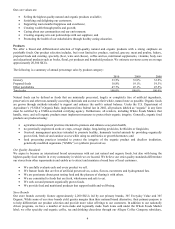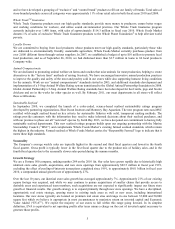Whole Foods 2010 Annual Report Download - page 20
Download and view the complete annual report
Please find page 20 of the 2010 Whole Foods annual report below. You can navigate through the pages in the report by either clicking on the pages listed below, or by using the keyword search tool below to find specific information within the annual report. 14
Intellectual Property
We rely on a combination of trademark, trade secret and copyright law and internal procedures and nondisclosure
agreements to protect our intellectual property. There can be no assurance that our intellectual property rights can be
successfully asserted in the future or will not be invalidated, circumvented or challenged. In addition, the laws of certain
foreign countries in which our products may be produced or sold do not protect our intellectual property rights to the same
extent as the laws of the United States. Failure to protect our proprietary information could have a material adverse effect on
our business, results of operations and financial condition.
Income Taxes
Our future effective tax rates could be adversely affected by the earnings mix being lower than historical results in states or
countries where we have lower statutory rates and higher than historical results in states or countries where we have higher
statutory rates, by changes in the valuation of our deferred tax assets and liabilities, or by changes in tax laws or
interpretations thereof. In addition, we are subject to periodic audits and examinations by the Internal Revenue Service
(“IRS”) and other state and local taxing authorities. The Company has been notified that the IRS will open an audit covering
fiscal years 2008 and 2007. With limited exceptions, the Company is no longer subject to federal income tax examinations
for fiscal years prior to 2007, and to state and local examinations for fiscal years prior to 2001. Our results could be
materially impacted by the determinations and expenses related to these and other proceedings by the IRS and other state and
local taxing authorities.
Information Systems
We rely extensively on information systems for point-of-sale processing in our stores, supply chain, financial reporting,
human resources and various other processes and transactions. Our information systems are subject to damage or interruption
from power outages, computer and telecommunications failures, computer viruses, security breaches, including breaches of
our transaction processing or other systems that could result in the compromise of confidential customer data, catastrophic
events, and usage errors by our team members. If our systems are breached, damaged or cease to function properly, we may
have to make significant investments to fix or replace them, suffer interruptions in our operations, face costly litigation, and
our reputation with our customers may be harmed. Any material interruption in our information systems may have a material
adverse effect on our business or results of operations.
Internal Control over Financial Reporting
The Company’s management is responsible for establishing and maintaining adequate internal control over financial
reporting. An internal control system, no matter how well designed and operated, can provide only reasonable, not absolute,
assurance that the objectives of the control system are met. Further, the design of a control system must reflect the fact that
there are resource constraints, and the benefits of controls must be considered relative to their costs. Because of the inherent
limitations in all internal control systems, internal control over financial reporting may not prevent or detect misstatements.
Any failure to maintain an effective system of internal control over financial reporting could limit our ability to report our
financial results accurately and timely or to detect and prevent fraud, and could expose us to litigation or adversely affect the
market price of our common stock. The Company’s management concluded that its internal control over financial reporting
was effective as of September 26, 2010. See “Item 9A. Controls and Procedures – Management’s Report on Internal Control
over Financial Reporting.”
Item 1B. Unresolved Staff Comments.
Not applicable.
Item 2. Properties.
As of September 26, 2010, we operated 299 stores: 288 stores in 38 U.S. states and the District of Columbia; 6 stores in
Canada; and 5 stores in the United Kingdom. We own 11 stores, two distribution facilities and land for one store in
development, including the adjacent property. We also own a building on leased land, which is leased to third parties, and
have two stores in development on leased land. All other stores, distribution centers, bakehouses and administrative facilities
are leased, with expiration dates ranging from 1 to 35 years. We have options to renew most of our leases in five-year
increments with renewal periods ranging from 5 to 50 years. In addition, as of September 26, 2010, we had 25 leased
properties that are not being utilized in current operations, of which 19 are related to Wild Oats, with expiration dates
ranging from 5 months to 19 years. We are actively negotiating to sublease or terminate leases related to these locations.
























